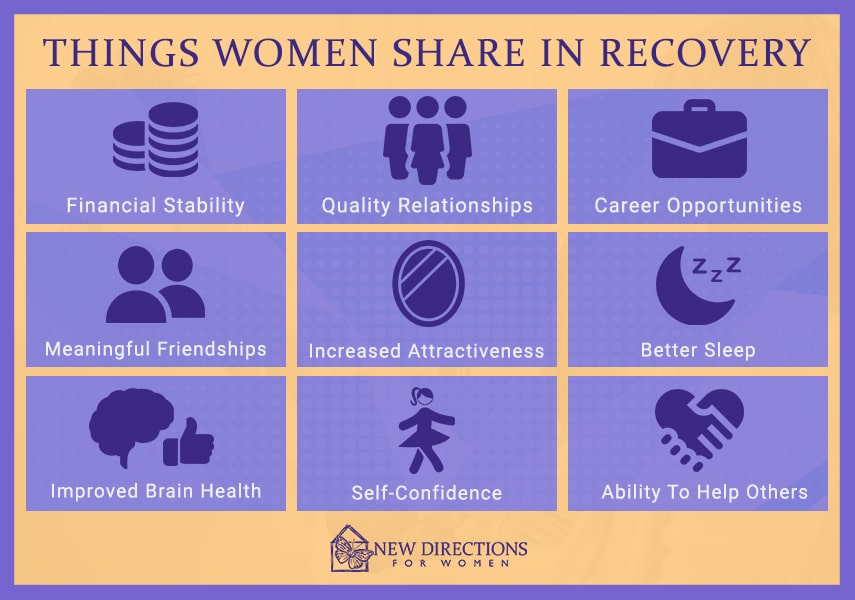Some of the most encouraging elements about recovering from addiction are often the most worried about. “Will I be able to enjoy my life in recovery?” Will there be any fun? What will happen when I am stressed? What about my friends and social life? Will I be a totally different person?”
Looking forward to a beautiful new beginning in recovery is both exciting and terrifying. While the experience will be different for every individual, recovering from addiction is universally considered a step in the right direction.
Hearing From Others Recovering From Addiction
When you’re just getting started on building a life in recovery, the future can seem uncertain. Although there will be many ups and downs, there is no doubt it will have been worth the ride. One of the ways to get past the skepticism is to hear from others who have been successful. These encouraging words testify to some changes that make recovering from addiction even more of an opportunity to invest in.
 Take it from women who got help for substance abuse who know what addiction feels like. Most will confirm that the grass is definitely greener on the other side once experiencing life sober. Not only will you be alive to enjoy it, you will feel more alive, too. Even better, you will be happy that you’re alive, and you’ll want to make the most of it. Looking back, these are some of the things women in recovery would like to share to help you overcome addiction.
Take it from women who got help for substance abuse who know what addiction feels like. Most will confirm that the grass is definitely greener on the other side once experiencing life sober. Not only will you be alive to enjoy it, you will feel more alive, too. Even better, you will be happy that you’re alive, and you’ll want to make the most of it. Looking back, these are some of the things women in recovery would like to share to help you overcome addiction.
1. Financial Stability Reduces Stress
One of the first things that many women notice after recovering from addiction is how financially stable they’ve become. This doesn’t always mean that they necessarily become rich overnight. Rather, there is less stress associated with money. Even something as simple as being able to pay a bill on time does wonders to reduce financial pressure.
The reduction of tension in itself is a quality that contributes to recovering from addiction. Being one of the most noted triggers, stress is the first thing that should be managed. Not only can stressful situations trigger relapse, but they can also lead to developing psychological abnormalities such as anxiety. Women recovering from addiction are no longer spending excessive amounts of money on drugs and alcohol. Instead, that money is being put to good use to get caught up and eventually accumulate significant savings.
2. Quality Relationships Form On Sturdy Foundation
For some, this may seem like a no-brainer; for others, it’s a big deal. Often, it is our family and loved ones who play the biggest part in encouragement in recovery. However, it’s also those closest to us who have been hurt the worst and most often. Needless to say, there will be some relationships that are beyond what is considered healthy to repair. Yet now, those relationships that have held strong are based on the fulfillment of the promise to complete rehab treatment.
In recovery, there will also be a time to work on certain relationships that have been damaged because of addiction. Family therapy during rehab allows for loved ones to open up and communicate feelings and expectations of life in recovery. Although no one can completely understand what addiction feels like, except those in recovery, knowledge is a powerful part of healing. The quality of relationships that develop through sobriety is the most rewarding contribution of achieving and maintaining life in recovery.
3. Job and Career Opportunities
Many women confess that the reason they didn’t go to rehab sooner was the fear of losing their job. They worried that they wouldn’t be able to take time off or find child care. However, the reality was that their job was suffering because of their substance abuse anyway. Most women who are dedicated to their career and need help for addiction find that outpatient rehab fits their needs.
In fact, most of the time, recovering from addiction is what has allowed for an incredible job opportunity to arise. Relying on their sober reinforcing practices of accountability, self-awareness, and determination reportedly helped land that dream job. Not only that, but employers look for individuals who are hardworking and goal-oriented. When you know how to work hard for what you want, it shows. That’s also what it takes to live successfully in recovery.
4. Discovering Meaningful Friendships
 During rehab, there will be many opportunities to meet new people and share experiences, while recovering from addiction. Unhealthy friendships that had developed during active addiction will become more obvious in recovery. Often, these are based on selfishness and greed and can’t progress past intoxication into sobriety.
During rehab, there will be many opportunities to meet new people and share experiences, while recovering from addiction. Unhealthy friendships that had developed during active addiction will become more obvious in recovery. Often, these are based on selfishness and greed and can’t progress past intoxication into sobriety.
While in treatment and then after in recovery, friendships based on encouragement and support will soon take their place. Group therapy is one of the first opportunities in treatment to share feelings openly among peers. From there, the overwhelming comfort and companionship will only add to character improvement while recovering from addiction. The support system, built on meaningful friendships and supportive reinforcement, is something that women in recovery point out as essential.
5. Increased Attractiveness Inside and Out
When a person is happy, they are instantly seen as more attractive. Happiness comes from a combination of contentment, purpose, and a sense of accomplishment, all of which are major parts of recovery. What’s more is that when we’re healthy and taking care of our bodies, we feel good. Health and happiness are two factors often achieved together in recovery.
By the time detox is complete, the body is ready to start recuperating. As we begin to heal both physically and emotionally, the way we present ourselves starts to change. Becoming more self-aware and confident is all a part of self-forgiveness through sobriety.
It’s not only our emotional and spiritual health that contributes to looking better. As the system begins to function without being inhibited by harmful substances, vitamins and minerals are used as intended. Now, when incorporating health-conscious and nutrient-packed foods into our sober routine, our body recognizes proper nourishment. So many physical attributes, such as our skin, hair, and nails reflect improved health in a major way. Through sobriety, you’ll appreciate what it really means to love yourself, inside and out.
6. Better Sleep Equals A Healthy Immune System
When the body’s sleep-wake rhythm is no longer being scrambled by drugs and alcohol, it begins to function properly. Addictions driven by stimulant abuse, like cocaine and methamphetamine, disrupt the natural flow of hormones that induce sleepiness and alertness. These hormones govern how our body functions right down to the fundamental level, from metabolism to heart rate.
Even depressant drugs like alcohol that seem to lead to drowsiness and increased sleep, are disrupting the quality of rest. They require so much of the body’s energy and attention to filter, they take away from sleep by inhibiting REM. Without adequate sleep, the body will no longer be able to block or fight off even the most basic illnesses. This would leave anyone feeling constantly run down.
However, after recovering from addiction, these functions typically regulate and begin repairing the damage left behind. For one, you’ll feel better because your body is doing what it’s supposed to do when asleep. Additionally, your immune system will have the chance to purge the body of harmful toxins. Combined, these sober attributes will get you back on your feet quicker than ever. What addiction feels like is anything but rested and healthy.
7. Memory, Energy, and Creativity Improve With Brain Health
Getting treatment and recovering from addiction can provide benefits for much more than a substance use disorder. In fact, many women unknowingly suffer from a co-occurring illness that contributes to the inability to get and stay sober. In the recovery community, this is called a dual diagnosis.
During treatment, properly caring for illnesses that are masked by addiction restores cognitive health. To begin with, treatment for psychological illness aims to regularly encourage a more stable mood. In addition, the longer the brain is given to heal from addiction, the better it will be able to perform. With higher levels of energy and improved memory, everyday tasks become easier. School and work performance also begin to show more proficiency.
8. Staying Present To Remember The Fun
Many women confess that addiction began due to the inability to cope with some sort of trauma. The idea behind getting drunk or high was to become momentarily unaware of their suffering deep down. Although it may have seemed like relief initially, the situation was almost always getting worse around them. Soon, to enjoy anything, their addiction needed to be fed first, and even happy memories were impaired.
In recovery, one very important practice is to develop a healthy sense of self-awareness during holistic therapy. Women who are living sober often recall how much more quickly inconveniences were resolved when practicing awareness, instead of intoxication. With their behaviors and rational thoughts no longer being driven by their addiction, better choices were made. This resolved a significant amount of uncertainty when facing obstacles head-on and made recalling memories and experiences more clearly.
9. Renewed Self-Confidence

There is something special that happens to us when we accomplish something to be proud of. It’s as if we are renewed in both hope and capability, remembering the power that we have over our decisions. By recovering from addiction, more and more women report their sense of empowerment and confidence to succeed. Taking bigger leaps in the right direction, with a clear sober mindset, makes an enormous difference in achieving success.
However, this is not always easy when what addiction feels like is front and center, and sobriety, so far away. One way to improve upon appreciation of our own personal value is to work with a therapist during individual therapy. During addiction treatment, one-on-one sessions incorporate checking in with personal progress. They also serve to uncover painful emotions that drive self-confidence down.
Taking the time and putting in the effort to release hurtful thoughts and emotions amplified by addiction encourages healing. Each day in recovery is a reminder of the path traveled and how capable one must be to live sober. Recognizing these accomplishments and being grateful for the opportunity to recover from addiction renews self-confidence and sense of value.
10. Unforgettable First Impressions
The power of a first impression can make or break a relationship. Whether the introduction is regarding working, platonic or romantic relationships, we can all benefit from showing off our best side. What many addicts don’t realize is that regardless of how hard they try, hiding addiction is virtually impossible. In one way or another, it shows. As a first impression, it often results in becoming an outcast or is avoided due to the unpredictable behaviors of an addict.
One of the qualities that change when recovering from addiction is the lack of pressure it takes to appear presentable. In recovery, women share how the quality of relationships based on sober first impressions, quickly mature. They’re often given more respect and communication, which typically builds trust and acceptance. Making a good first impression can improve the quality of multiple areas of an individual’s life, socially or professionally. It suggests that you’re not only responsible in the physical aspect, but also responsible for your words and actions.
11. The Ability To Help Others
By far the most satisfying ability that becomes possible in recovery is the ability to better care for others. During times of addiction, and especially intoxication, the capacity to help others is secondary, if that. Sometimes, it even crosses the line into neglect.
Because let’s face it, when we are abusing substances regularly, we’re probably not even taking care of ourselves properly. But once in recovery and following a healthy and rewarding aftercare program, giving more of ourselves may even be enjoyable.
Helping others who are helping themselves improve gives each of us a sense of purpose. The feeling of being needed also contributes to accountability, further reinforcing the need to protect our sobriety. Before recovering from addiction, many opportunities encouraging women to keep moving forward, couldn’t even be considered possible. However, sobriety is a commitment that has to be faithfully cared for and maintained constantly.
Become Your Own Reason To Overcome Addiction
There are a thousand more reasons to make the commitment and begin recovering from addiction. But for treatment to work, you have to make the choice to do it for yourself. Think of how much better things would be if addiction wasn’t lurking around every corner. Consider how much better you will look and feel and all of the things that you won’t miss about dependency. Become your own reason to get sober, and live a life of which you can be proud.
Get excited about getting sober and living in recovery and connect with us for more information on available programs. If there was ever something to invent in making improvements on, your own healthy life will pay off the most.
References:
- https://pennsylvaniarecoverycenter.org/living-a-sober-life/
- https://www.marketwatch.com/story/this-is-what-happens-to-the-finances-of-addicts-and-their-families-2019-01-09
- https://www.washingtonpost.com/national/health-science/one-of-the-biggest-challenges-of-kicking-addiction-is-getting-and-keeping-a-job/2018/11/27/87e8a168-d958-11e8-aeb7-ddcad4a0a54e_story.html
- https://www.nature.com/articles/s41386-019-0465-x
- https://pennsylvaniarecoverycenter.org/living-a-sober-life/












